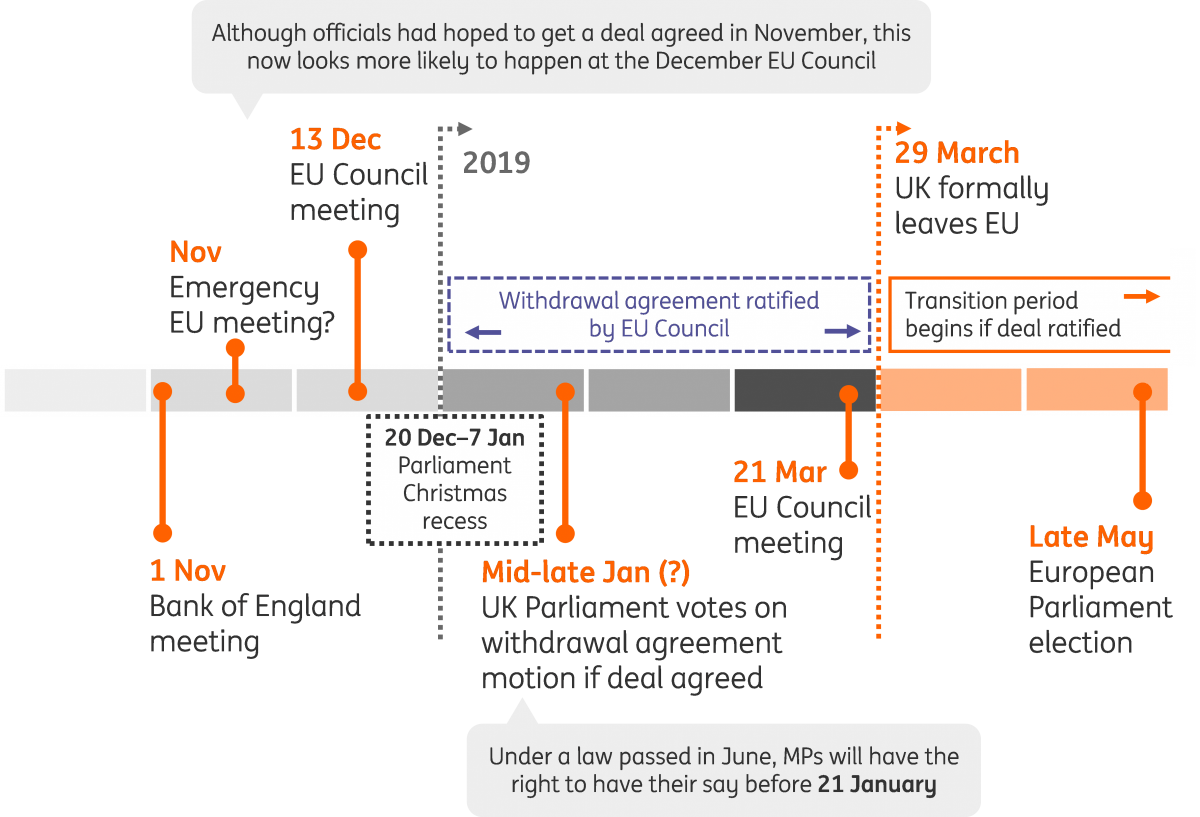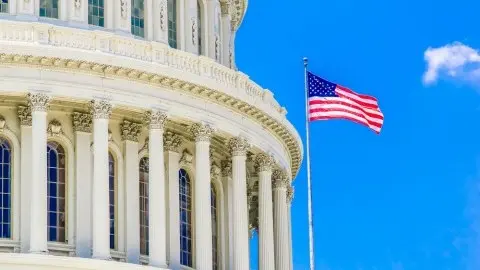Brexit blog: Don’t count on the gift of a Christmas deal
Sterling has jumped on reports Brexit talks are inching closer to a conclusion, but the fundamental challenge of getting a deal approved hasn't gone away. Don't rule out Brexit talks stretching into December or even well into the new year, as the UK government tries to focus minds in Parliament
After all the ups and downs of the October EU Council meeting, things went eerily quiet on the Brexit front in recent days. But that was until earlier this morning when reports emerged suggesting the UK government remains hopeful a deal can be agreed at an emergency EU Leaders' meeting later in November.
However, we'd caution this remains far from guaranteed, and to understand why it's worth going back to the crucial question in the Brexit debate. That is, will any UK-EU agreement be approved by British MPs?
Despite the latest encouraging news reports, the reality is we are no closer to knowing the answer.
Theresa May's central challenge
Given that the EU is unlikely to back down on the controversial Irish backstop – an insurance policy designed to rule out a future hard border on the island of Ireland – the central challenge for Prime Minister Theresa May is to find a way of convincing Parliament that it will never come into effect.
Over recent weeks, there have been a few hints at what sort of compromises are being considered to help her achieve this. Last month we discussed one proposal to allow the whole of the UK to remain in a customs union, at least temporarily, in the event of the Irish backstop kicking in. That would remove the potential need for tariff collection on goods travelling between Northern Ireland and the rest of the UK, but would still require items to be checked against EU standards. The hope is that these regulatory processes could be “de-dramatised”, for instance by performing agricultural checks at farms rather than at the ports themselves.
However, the Northern Irish Democratic Unionist Party (DUP), on which the government relies on for its majority in the House of Commons have said they won’t accept any solution where there could be regulatory barriers between Northern Ireland and the rest of the UK.
Plan B: Extend the transition period
With that mind, Theresa May has opened the door to a potential plan B: simply extend the transition period for as long as is needed to find a more permanent solution. This would mean that nothing would really change compared to the current trading relationship, in which the UK participates in the single market and customs union. In any case, at just 21 months, few people expect the current length of the transition to be long enough to either negotiate a wide-ranging trading relationship (whatever form that may take) or to give firms time to adjust.
Nobody really knows whether these compromises will be enough to secure the Parliamentary numbers
But while an extended transition may help appease some of the DUP’s concerns, it has raised the hackles of pro-Brexit MPs in the Conservative party. They fear that UK will effectively remain in the EU for many years to come, without a say in European law during this period. It’s also likely that any extended transition period would require further UK contributions to the EU budget, which is also unpopular amongst the British public.
A third compromise - evolution clause
Given all of this, the EU has hinted at a third compromise - a so-called “evolution clause”. While the goal is to agree on a political declaration – a very vague and short document outlining the scope of future trade negotiations - this clause would give the UK a mechanism to change its mind in future. The hope is that this will help convince lawmakers to approve the overall withdrawal agreement, safe in the knowledge that all the options on future trade are still effectively on the table.
The UK Government may play for time
Nobody really knows whether these compromises will be enough to secure the Parliamentary numbers to pass a deal by British lawmakers – particularly given that, whatever fudge is agreed, the legally-binding backstop is still likely to be firmly embedded in the agreement.
But one thing looks increasingly clear. Given the limited scope for negotiators to pull out any more white rabbits, it looks increasingly likely that Prime Minister May will try and play for time.
By pushing back the crunch vote in the House of Commons on the final deal as far as she can, the hope is that this will help to focus Parliamentarians minds and make the vote a much more binary choice between deal and no deal as the time for renegotiation would almost be non-existent.
This tactic may also encourage some opposition MPs to vote with the government, particularly given that in the case of the Labour Party, the hints about future customs union membership are not very far away from their own Brexit policy.
The key dates with five months left

The big questions: How 'late' is really 'late'?
There is still a possibility that both sides come together and reach a deal in time for the December EU summit. That would probably tee-up the vote in the House of Commons for mid-January when MPs return from Christmas breaks. In principle, the Prime Minister is obliged to put any deal to Parliament by 21 January.
But that said, we think there is an increasing risk that things slip further and we certainly wouldn’t rule out an agreement much closer to the UK’s exit date. After all, the only true deadline in the process is March 29th when the Article 50 ends – and even here, when push comes to shove there may willingness to extend the period if purely to create more time for ratification and legalities.
In principle, the PM is obliged to put any deal to Parliament by 21 January but we certainly wouldn’t rule out an agreement much closer to the UK’s exit date - as the ony real deadline is March 29
Whatever happens, our central message is that it may still be quite a while before we know for sure whether ‘no deal’ has been avoided. Even though we think the odds of the UK crashing out on WTO terms are perhaps 20%-30% at this stage, most firms don’t have the luxury to wait to find out for sure. This means we’re likely to hear about more companies executing contingency plans or preparations over coming weeks.
From an economic perspective, we think this could see growth begin to slow over the winter as uncertainty increases. This makes it look pretty unlikely that the Bank of England will hike before May 2019, at the earliest.
Download
Download article
2 November 2018
In case you missed it: Change of guard This bundle contains 9 articlesThis publication has been prepared by ING solely for information purposes irrespective of a particular user's means, financial situation or investment objectives. The information does not constitute investment recommendation, and nor is it investment, legal or tax advice or an offer or solicitation to purchase or sell any financial instrument. Read more

